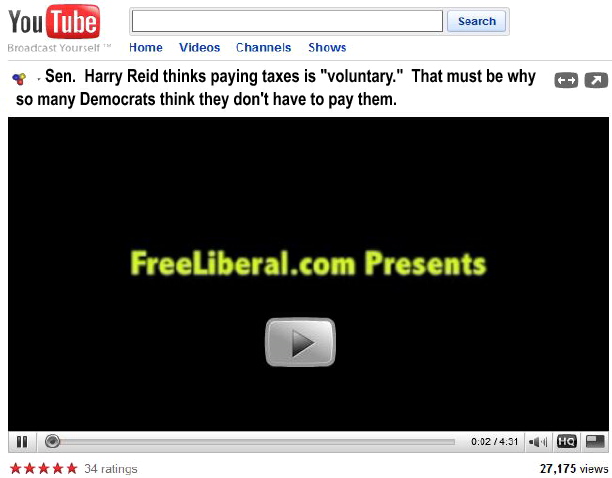
News
Behind the Headlines
Two-Cents Worth
Video of the Week
News Blurbs
Articles
Testimony
Bible Questions
Internet
Articles (2012)
Internet Articles (2011)
Internet Articles (2010)
Internet Articles
(2009)
Internet Articles (2008)
Internet Articles (2007)
Internet Articles (2006)
Internet Articles (2005)
Internet Articles (2004)
Internet Articles (2003)
Internet Articles (2002)
Internet Articles (2001)


![]()
From a perspective of legal
speak Sen. Harry Reid adamantly
defends the proposition that the US income tax system is a
completely voluntary tax system solely because in many nations
(most of them totalitarian) the tax collectors take their share of
your wages as you earn them, not when you are paid. What makes
the US system "voluntary" is that US taxpayers are allowed to
compute their own tax debt based on their earnings. But, that's
as far as "voluntary" goes. Uncle Sam doesn't ask you if you
want
to pay taxes...they only tell you how much jail time you will get if
you don't. I guess in Reid's perspective, you can voluntarily pay
your taxes or voluntarily go to jail.
When the New Deal Congress enacted the Social Security Act of 1935 it contained a provision that required for the payroll deduction of Social Security taxes. Yet, the income tax, legalized with the fraudulent ratification of the 16th Amendment, did not include payroll deduction because tax proponents—including FDR's cousin, Teddy Roosevelt—believed there would be a citizens' revolt when an income tax was implemented.
J.P. Morgan used Social Progressive Teddy Roosevelt to urge lawmakers to enact a federal income tax in 1907 to "solve" the "financial crisis" that was fabricated by Morgan when he orchestrated a massive Bank Panic that year, creating the first recession of the 20th Century and costing working class depositors millions of dollars of sweat equity wages, tucked away in a bank for the "rainy day" when they were sick and could not work. The purpose of the subterfuge by the transnational barons of banking was to accomplish what Roosevelt tried to do in 1933 and what Barack Obama is now attempting to complete—transforming the United States into something completely different than what the US Constitution, intended. In FDR's case, he added the unelected 4th branch of government which owed its existence to the social progressive agenda of the money barons. And Obama's current efforts to complete the transformation of the global serfdom that will become the economic drones of the privileged elite under the guise of making the world a safer place—for those privileged few who fear the masses.
William Howard Taft who believed in a limited tax on the wealthy, agreed not to stand in the way of a 1% legislated income tax in 1909. Taft was convinced that Congress, which needed to get reelected, would not pass it because the people were adamantly opposed to it. Taft was also convinced the social progressives did not have the votes to enact an income tax. At the same time, he was convinced the Supreme Court would overturn if they did legislate, just as they did in 1895.
It's important to understand that before any social progressive movement has ever successfully taken root in this country it was preceded by a gilded age of personal prosperity for the middle class. There is, and has always been, a fear on the part of the potentate rich that, if the middle class was not periodically stripped of its wealth through taxation, ultimately they would be on economic par with the rich and be able to compete with the money barons and knock them from the pinnacles of political and economic power. Therefore, each period of prosperity ends with a cycle of increased taxation designed to widen the gap between the rich and the middle class that would also close the gap between the middle class and poverty class. The last "gilded ages" in the United States took place in the last decade of the 19th century, the second decade of the 20th century, and the Reagan Era from 1985 to 2007.
Congress used Franklin Roosevelt's trite "national emergency" in 1943 by arguing that the war effort required a rapid collection of taxes to expedite the war effort. FDR, who was planning to run for a fourth term in 1944 knew that Uncle Sam reaching into the pockets of American citizens before they even got paid would not set well with the American people. The Revenue Act of 1943 is an anomaly in the world of taxes since, generally social progressives have never see a tax they didn't love.
The Revenue Act of 1943 was the first piece of tax legislation ever vetoed by a far left president and enacted by Congress over the veto. The provision in HR 3687 that FDR resisted was a rider, HR 2570, the Current Payment Act of 1943 which was referred to by Congress as the "pay-as-you-go" concept creating the "withholding system" every taxpayer is familiar with. Prior to that, taxpayers had two years to pay their federal tax bill. To make the legislation palatable to a president who would be seeking reelection, Congress included a provision in HR 2570 that would forgive one year of taxes for every taxpayer as the withholding system was implemented. When that didn't bring FDR over, they junked the idea and implemented 26 USC 3401, adding a "estimated tax payment" for self-employed people who had no idea how much money they were earn. So much for the volunteer tax system.

Copyright © 2009 Jon Christian Ryter.
All rights reserved.
